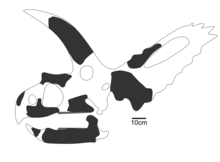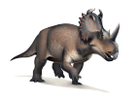Coahuilaceratops
| Coahuilaceratops Temporal range: Late Cretaceous,
| |
|---|---|

| |
| Skull of Coahuilaceratops | |
| Scientific classification | |
| Domain: | Eukaryota |
| Kingdom: | Animalia |
| Phylum: | Chordata |
| Clade: | Dinosauria |
| Clade: | †Ornithischia |
| Clade: | †Neornithischia |
| Clade: | †Ceratopsia |
| Family: | †Ceratopsidae |
| Subfamily: | †Chasmosaurinae |
| Genus: | †Coahuilaceratops Loewen et al., 2010 |
| Species: | †C. magnacuerna
|
| Binomial name | |
| †Coahuilaceratops magnacuerna Loewen et al., 2010
| |
Coahuilaceratops (meaning "Coahuila horn face") is a genus of herbivorous ceratopsian dinosaur. It is a chasmosaurine ceratopsian which lived during the Late Cretaceous period (late Campanian stage) in what is now southern Coahuila in northern Mexico. It is known from the holotype CPC 276, a partial skeleton of an adult individual which includes several skull elements. Another specimen, CPS 277, may represent a juvenile Coahuilaceratops. All specimens of Coahuilaceratops were collected from a single location in the middle strata of the Cerro del Pueblo Formation, which dates to between 72.5 and 71.4 million years ago.[1]

It was formally described in 2010, though it appeared as an informal designation (nomen nudum) as early as 2008.[2] Coahuilaceratops was named by Mark A. Loewen, Scott D. Sampson, Eric K. Lund, Andrew A. Farke, Martha C. Aguillón-Martínez, C.A. de Leon, R.A. Rodríguez-de la Rosa, Michael A. Getty and David A. Eberth in 2010 and the type species is Coahuilaceratops magnacuerna.[1] Although based on incomplete remains, Coahuilaceratops is thought to possess among the largest horns of any dinosaur currently known, rivaling in absolute size those of larger Chasmosaurines like Triceratops and Torosaurus. Its horns are estimated to have been up to 1.2 m (4 feet) long.[3][1]
See also
References
- ^ a b c Loewen, M.A., Sampson, S.D., Lund, E.K., Farke, A.A., Aguillón-Martínez, M.C., de Leon, C.A., Rodríguez-de la Rosa, R.A., Getty, M.A., Eberth, D.A., 2010, "Horned Dinosaurs (Ornithischia: Ceratopsidae) from the Upper Cretaceous (Campanian) Cerro del Pueblo Formation, Coahuila, Mexico", In: Michael J. Ryan, Brenda J. Chinnery-Allgeier, and David A. Eberth (eds), New Perspectives on Horned Dinosaurs: The Royal Tyrrell Museum Ceratopsian Symposium, Indiana University Press, 656 pp.
- ^ Gozález, Edgar (2008-11-20). "Hallan en Coahuila nuevo dinosaurio". Vanguardia (in Spanish). Retrieved 2009-10-11.[permanent dead link]
- ^ http://www.eurekalert.org/pub_releases/2010-05/uou-fhd052510.php eurekalert - First horned dinosaur from Mexico




